HOME >> CHINA,SPECIAL-COVERAGE
Macao sets an example to strengthen links with motherland through identity courses
By Cao Siqi and Zou Zhidong in Macao Source:Global Times Published: 2019/12/18 19:28:40
○ The national flag, national anthem and national emblem are well-known in Macao's schools as symbols of the motherland
○ Macao uses a special moral education textbook to guide its teachers and foster unity and patriotism among Macao youth
In sharp contrast with some young people on the streets of Hong Kong staging anti-government riots that paralyzed the city, residents in another special administrative region Macao uphold a strong sense of patriotism. After the city returned to China from Portugal, it has stepped increasingly closer to its motherland over the past years.
Upon the arrival of the 20th anniversary of Macao's return to China, Global Times reporters visited the city and found that Macao has had a long tradition of patriotic loyalty even before it returned to the motherland in 1999. Since 1999, the tradition has been well maintained and promoted at different levels of government, social communities and especially in education.
Just like what Chief Executive Chui Sai On said in his work review about the past 10 years of policy implementation, advocating the core value of "being loyal to the country and to Macao" was one of his main governing concepts, and the regional government has explored a mature and successful method in the education of national history and conditions, as well as on how to inspire their love for the country and for Macao in primary and middle schools.
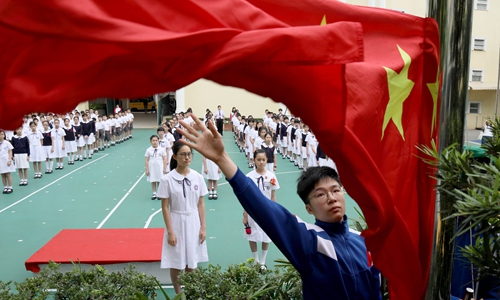
Love China, love Macao
On December 12, Global Times reporters went to Pui Ching Middle School, one of the most reputable schools in Macao that emphasizes patriotic education. Stepping into the school, one will face a playground with the Chinese national flag and the Macao regional flag flying together right in the middle.
Every Monday morning, the school holds a national flag-raising ceremony attended by all teachers and students. Flag raisers understand that the regional flag should not be raised faster than the Chinese national flag.
The majority of primary and middle schools in Macao hold national flag-raising ceremonies every Monday morning. All schools, colleges and universities in Macao fly the national flag. The national flag, national anthem and national emblem are well known in Macao's schools as symbols of the motherland.
On the right hand was a building for primary school students. In a sixth grade class, a teacher was playing the song "My People, My Country." The music was from a special film with the same name that marks the 70th anniversary of the founding of the People's Republic of China (PRC). Many students told the Global Times they loved the opening segment of the movie the most, which tells a story of an engineer racing against time to perfect an automatic flag-raising mechanism before the founding ceremony of the PRC on October 1, 1949.
The song's lyrics describe the relationship between "my country and I" as "the sea and the spray." When the teacher asked students what the allegory means, a boy stood up, answering out loud that "the spray can not exist without the sea."
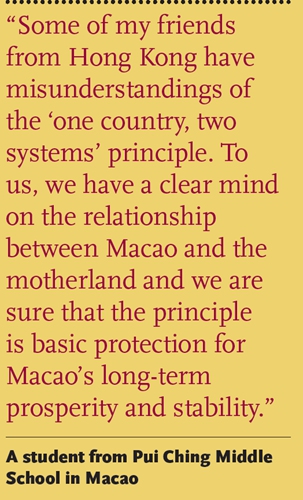
On the blackboard at the back of the classroom are paper-cuts of a dragon, the symbol of the Chinese nation, the Chinese national flag and the Macao regional flag, and the key articles of the Basic Law. In the middle of the blackboard are 14 eye-catching Chinese characters which call for uniting behind and upholding the Basic Law. Some characters advocate that the "one country, two systems" principle brings prosperity.
In another general knowledge class for the third grade, students wrote down the meaning of the five stars on the Chinese national flag with their iPads. "The Communist Party of China," "The Chinese nation," "Red represents countless martyrs who brought the revolutionary victory with their blood," were just some of the students' response within a few minutes.
Upstairs, in a design and science class, Global Times reporters saw the teacher asking students to use Lego bricks to express their understandings of the China-proposed Belt and Road Initiative. A student in the sixth grade pieced up the bricks to the image of two hands holding each other, while another one made up two English characters: win-win. Others on the board included camel, a symbol of ancient Silk Road, and a high-speed train, one of the important enablers of international cooperation projects under the initiative.
Explaining why she decided to blend the country's policies into a science class, teacher Chan Siu Teng, who was born in Macao and pursued her undergraduate study in the mainland, told the Global Times that "my duty is to cultivate science talent for my country," and "help them better integrate in the country's development."
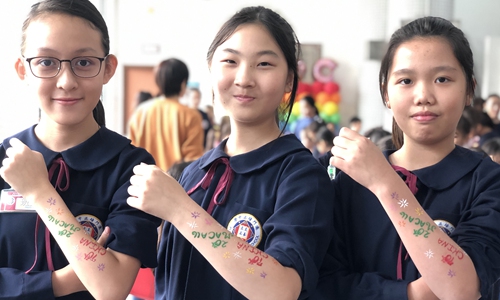
In the school's library, a group of middle school students acted out a drama themed on the Constitution and the Basic Law. In their story, they used a time machine to go back hundreds of years ago to when the Portuguese occupied the city. But the students travel onward towards the present to witness how Macao has developed since its return to China.
Library director Lau Wai Man told the Global Times that since this year marks the 70th anniversary of the founding of the PRC and the 20th anniversary of Macao's return to China, as well as the recent political turmoil in Hong Kong, she decided to hold several activities to better promote the knowledge of Basic Law among students.
Apart from short dramas, knowledge quizzes and games help students better understand the significance of the Basic Law.
Liang Zhanchong, a senior middle school student, wrote the play. "I conducted extensive researches and gained a deeper understanding on how Macao returned to China and how the Basic Law was formulated," said Liang.
This campaign also inspired Tao Chang, a senior high school student, to be the champion of the country's national competition of learning and practicing the Chinese Constitution.
Tao is her school's star ping pong player and has seized several awards in regional and international ping pong matches. During the national Chinese Constitution competition, she shared her story of participating in an Asian middle school table tennis match.
After she won against an Indian player, she was greeted by her opponent with "Congratulations, Macao team!" She then corrected her, saying that she was from the Chinese Macao team. The Indian player further asked her why her team flag is different from the Chinese national flag, to which she explained the regional flag has the same five stars as those of the national flag, which symbolizes that Macao is a part of China.
"Apparently, the Indian player did not understand the relationship between Macao and the Chinese mainland and did not know Macao resident are also Chinese. As I have participated in many international competitions, I would tell foreign players that China's Constitution stipulates that the country can establish special administrative regions when necessary and the National People's Congress formulated the Basic Law of Macao and established the principle of 'one country, two systems' and 'Macao people governing Macao,'" Tao told the Global Times.
Students in Macao interviewed by the Global Times have expressed how the Basic Law serves their career plans. Many said that the Basic Law is not a cold legal document to them, but a concept closely related to their daily lives. They said learning the Basic Law and the country's conditions and policies have motivated them to go to the mainland and find more job opportunities.
"Some of my friends from Hong Kong have misunderstandings of the 'one country, two systems' principle. They received an education which is more pro-West than ours and may feel that the two systems are totally different and the regional government enjoys the same rights as that of the central government. However, to us, we have a clear mind on the relationship between Macao and the motherland and we are sure that the principle is basic protection for Macao's long-term prosperity and stability," a senior high school student told the Global Times.
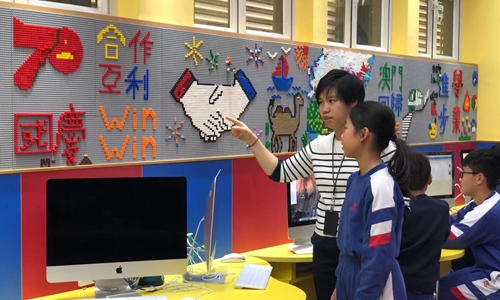
Patriotic education
Kou Kam Fai, president of Pui Ching Middle School, said the school's education fostering patriotism has been carried out with the assistance of culture. The school not only offers courses including calligraphy, Putonghua, history and current affairs, and moral education, but also attaches importance to exchanges with mainland organizations and institutions.
In 2013, the school established a Chinese culture museum, which houses 1,500 collections covering silk, chinaware, bronze ware and ancient currencies. The museum also is used as a classroom for ethics, history and Chinese literature classes.
Chong Chon Fai, a Peking University graduate with a PhD in history and the museum's director, told the Global Times that Macao residents cherish a patriotic tradition. During the Portuguese-ruled period when the Western and Eastern cultures met and collided, Macao residents preserved their traditional culture and customs.
The Chinese National History Magazine said that even during colonization, Chinese was still the official language of Macao.
During the War of Resistance against Japanese Aggression (1931-1945), more than 50 Macao associations jointly established a relief association that organized people to go to the countryside and mobilize people to unite and save the country. Many people opened schools here, invested in education, and promoted the spirit of patriotism.
After returning to China, the regional government has increased investment in education. After decades of development, Macao has significantly transformed its colonial education to a modern education system with Macao characteristics.
Pui Ching Middle School is just miniature snapshot of Macao's patriotic education.
In 2006, the regional government revised the "Outline of the Non-Higher Education System" to set "love the country and love Macao" and cultivating a sense of responsibility to the country and Macao as overall education goals.
The government compiled textbooks suitable to Macao's conditions and its people, and co-edited the textbooks "Moral and Citizenship" and "History" with the mainland's People's Education Publishing House.
The textbook "Moral and Citizenship" is now used in Pui Ching Middle School, guiding teachers and fostering unity and patriotism for Macao youth.
In 2016, Chief Executive Chui Sai On announced that junior and senior high schools will use the history textbook jointly compiled and published by the Macao Education Bureau and People's Education Publishing House starting from 2020. There hasn't been a unified history textbook in Macao and the city also faced a serious shortage of professional history teachers.
In addition to government and school efforts, Macao's various communities provide a platform for youth to learn about China's history and development. For example, in September, the Association for the Promotion of Chinese Ethnic Unity in Macao invited about 100 college students from different ethnic groups to have an exchange with Macao high school students.
Kou believed that the problems in Hong Kong's education problems could serve as a warning to Macao, which will inspire regional government to put more resources in its education and bring more opportunities for Macao students to understand and cherish prosperity and the unity with the motherland.
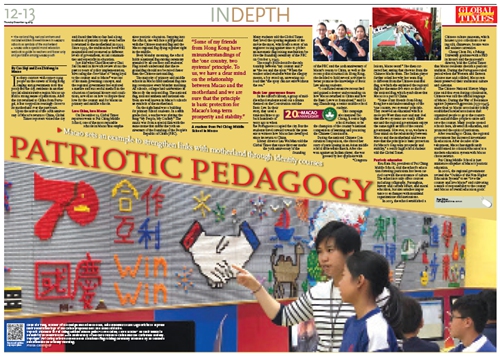
Newspaper headline: Patriotic pedagogy
○ Macao uses a special moral education textbook to guide its teachers and foster unity and patriotism among Macao youth
In sharp contrast with some young people on the streets of Hong Kong staging anti-government riots that paralyzed the city, residents in another special administrative region Macao uphold a strong sense of patriotism. After the city returned to China from Portugal, it has stepped increasingly closer to its motherland over the past years.
Upon the arrival of the 20th anniversary of Macao's return to China, Global Times reporters visited the city and found that Macao has had a long tradition of patriotic loyalty even before it returned to the motherland in 1999. Since 1999, the tradition has been well maintained and promoted at different levels of government, social communities and especially in education.
Just like what Chief Executive Chui Sai On said in his work review about the past 10 years of policy implementation, advocating the core value of "being loyal to the country and to Macao" was one of his main governing concepts, and the regional government has explored a mature and successful method in the education of national history and conditions, as well as on how to inspire their love for the country and for Macao in primary and middle schools.

Pui Ching Middle School holds a national flag-raising ceremony attended by all teachers and students on Monday morning. Photo: Cao Siqi/GT
Love China, love Macao
On December 12, Global Times reporters went to Pui Ching Middle School, one of the most reputable schools in Macao that emphasizes patriotic education. Stepping into the school, one will face a playground with the Chinese national flag and the Macao regional flag flying together right in the middle.
Every Monday morning, the school holds a national flag-raising ceremony attended by all teachers and students. Flag raisers understand that the regional flag should not be raised faster than the Chinese national flag.
The majority of primary and middle schools in Macao hold national flag-raising ceremonies every Monday morning. All schools, colleges and universities in Macao fly the national flag. The national flag, national anthem and national emblem are well known in Macao's schools as symbols of the motherland.
On the right hand was a building for primary school students. In a sixth grade class, a teacher was playing the song "My People, My Country." The music was from a special film with the same name that marks the 70th anniversary of the founding of the People's Republic of China (PRC). Many students told the Global Times they loved the opening segment of the movie the most, which tells a story of an engineer racing against time to perfect an automatic flag-raising mechanism before the founding ceremony of the PRC on October 1, 1949.
The song's lyrics describe the relationship between "my country and I" as "the sea and the spray." When the teacher asked students what the allegory means, a boy stood up, answering out loud that "the spray can not exist without the sea."

On the blackboard at the back of the classroom are paper-cuts of a dragon, the symbol of the Chinese nation, the Chinese national flag and the Macao regional flag, and the key articles of the Basic Law. In the middle of the blackboard are 14 eye-catching Chinese characters which call for uniting behind and upholding the Basic Law. Some characters advocate that the "one country, two systems" principle brings prosperity.
In another general knowledge class for the third grade, students wrote down the meaning of the five stars on the Chinese national flag with their iPads. "The Communist Party of China," "The Chinese nation," "Red represents countless martyrs who brought the revolutionary victory with their blood," were just some of the students' response within a few minutes.
Upstairs, in a design and science class, Global Times reporters saw the teacher asking students to use Lego bricks to express their understandings of the China-proposed Belt and Road Initiative. A student in the sixth grade pieced up the bricks to the image of two hands holding each other, while another one made up two English characters: win-win. Others on the board included camel, a symbol of ancient Silk Road, and a high-speed train, one of the important enablers of international cooperation projects under the initiative.
Explaining why she decided to blend the country's policies into a science class, teacher Chan Siu Teng, who was born in Macao and pursued her undergraduate study in the mainland, told the Global Times that "my duty is to cultivate science talent for my country," and "help them better integrate in the country's development."

Students in Pui Ching Middle School paint "I love China, I love Macao" on their hands in an activity to celebrate the 20th anniversary of Macao's return to China and the Christmas holiday. Photo: Cao Siqi/GT
Basic Law guarantees futureIn the school's library, a group of middle school students acted out a drama themed on the Constitution and the Basic Law. In their story, they used a time machine to go back hundreds of years ago to when the Portuguese occupied the city. But the students travel onward towards the present to witness how Macao has developed since its return to China.
Library director Lau Wai Man told the Global Times that since this year marks the 70th anniversary of the founding of the PRC and the 20th anniversary of Macao's return to China, as well as the recent political turmoil in Hong Kong, she decided to hold several activities to better promote the knowledge of Basic Law among students.
Apart from short dramas, knowledge quizzes and games help students better understand the significance of the Basic Law.
Liang Zhanchong, a senior middle school student, wrote the play. "I conducted extensive researches and gained a deeper understanding on how Macao returned to China and how the Basic Law was formulated," said Liang.
This campaign also inspired Tao Chang, a senior high school student, to be the champion of the country's national competition of learning and practicing the Chinese Constitution.
Tao is her school's star ping pong player and has seized several awards in regional and international ping pong matches. During the national Chinese Constitution competition, she shared her story of participating in an Asian middle school table tennis match.
After she won against an Indian player, she was greeted by her opponent with "Congratulations, Macao team!" She then corrected her, saying that she was from the Chinese Macao team. The Indian player further asked her why her team flag is different from the Chinese national flag, to which she explained the regional flag has the same five stars as those of the national flag, which symbolizes that Macao is a part of China.
"Apparently, the Indian player did not understand the relationship between Macao and the Chinese mainland and did not know Macao resident are also Chinese. As I have participated in many international competitions, I would tell foreign players that China's Constitution stipulates that the country can establish special administrative regions when necessary and the National People's Congress formulated the Basic Law of Macao and established the principle of 'one country, two systems' and 'Macao people governing Macao,'" Tao told the Global Times.
Students in Macao interviewed by the Global Times have expressed how the Basic Law serves their career plans. Many said that the Basic Law is not a cold legal document to them, but a concept closely related to their daily lives. They said learning the Basic Law and the country's conditions and policies have motivated them to go to the mainland and find more job opportunities.
"Some of my friends from Hong Kong have misunderstandings of the 'one country, two systems' principle. They received an education which is more pro-West than ours and may feel that the two systems are totally different and the regional government enjoys the same rights as that of the central government. However, to us, we have a clear mind on the relationship between Macao and the motherland and we are sure that the principle is basic protection for Macao's long-term prosperity and stability," a senior high school student told the Global Times.

Chan Siu Teng, teacher of the design and science class, asks students to use Lego bricks to express their understandings of the China-proposed Belt and Road Initiative. Photo: Cao Siqi/GT
Patriotic education
Kou Kam Fai, president of Pui Ching Middle School, said the school's education fostering patriotism has been carried out with the assistance of culture. The school not only offers courses including calligraphy, Putonghua, history and current affairs, and moral education, but also attaches importance to exchanges with mainland organizations and institutions.
In 2013, the school established a Chinese culture museum, which houses 1,500 collections covering silk, chinaware, bronze ware and ancient currencies. The museum also is used as a classroom for ethics, history and Chinese literature classes.
Chong Chon Fai, a Peking University graduate with a PhD in history and the museum's director, told the Global Times that Macao residents cherish a patriotic tradition. During the Portuguese-ruled period when the Western and Eastern cultures met and collided, Macao residents preserved their traditional culture and customs.
The Chinese National History Magazine said that even during colonization, Chinese was still the official language of Macao.
During the War of Resistance against Japanese Aggression (1931-1945), more than 50 Macao associations jointly established a relief association that organized people to go to the countryside and mobilize people to unite and save the country. Many people opened schools here, invested in education, and promoted the spirit of patriotism.
After returning to China, the regional government has increased investment in education. After decades of development, Macao has significantly transformed its colonial education to a modern education system with Macao characteristics.
Pui Ching Middle School is just miniature snapshot of Macao's patriotic education.
In 2006, the regional government revised the "Outline of the Non-Higher Education System" to set "love the country and love Macao" and cultivating a sense of responsibility to the country and Macao as overall education goals.
The government compiled textbooks suitable to Macao's conditions and its people, and co-edited the textbooks "Moral and Citizenship" and "History" with the mainland's People's Education Publishing House.
The textbook "Moral and Citizenship" is now used in Pui Ching Middle School, guiding teachers and fostering unity and patriotism for Macao youth.
In 2016, Chief Executive Chui Sai On announced that junior and senior high schools will use the history textbook jointly compiled and published by the Macao Education Bureau and People's Education Publishing House starting from 2020. There hasn't been a unified history textbook in Macao and the city also faced a serious shortage of professional history teachers.
In addition to government and school efforts, Macao's various communities provide a platform for youth to learn about China's history and development. For example, in September, the Association for the Promotion of Chinese Ethnic Unity in Macao invited about 100 college students from different ethnic groups to have an exchange with Macao high school students.
Kou believed that the problems in Hong Kong's education problems could serve as a warning to Macao, which will inspire regional government to put more resources in its education and bring more opportunities for Macao students to understand and cherish prosperity and the unity with the motherland.

Newspaper headline: Patriotic pedagogy
Posted in: IN-DEPTH,FOCUS